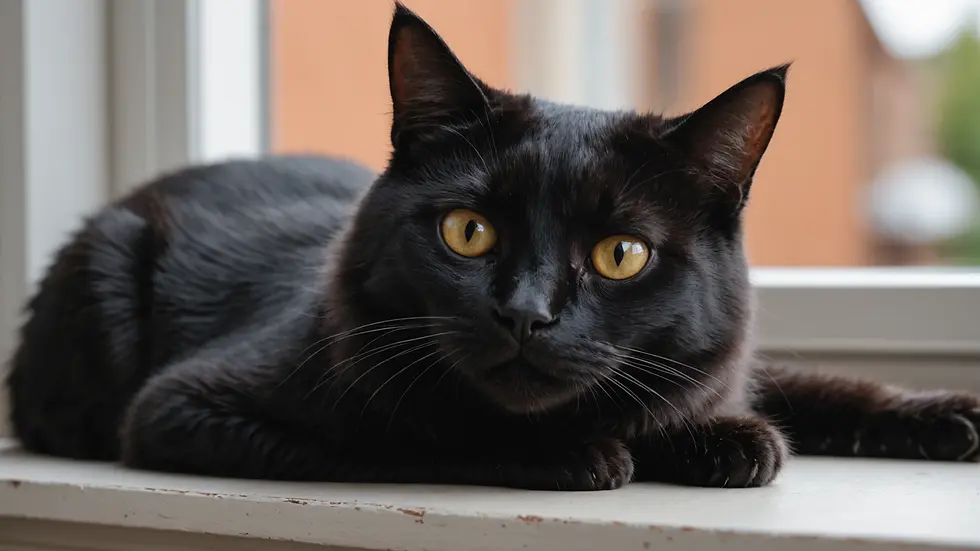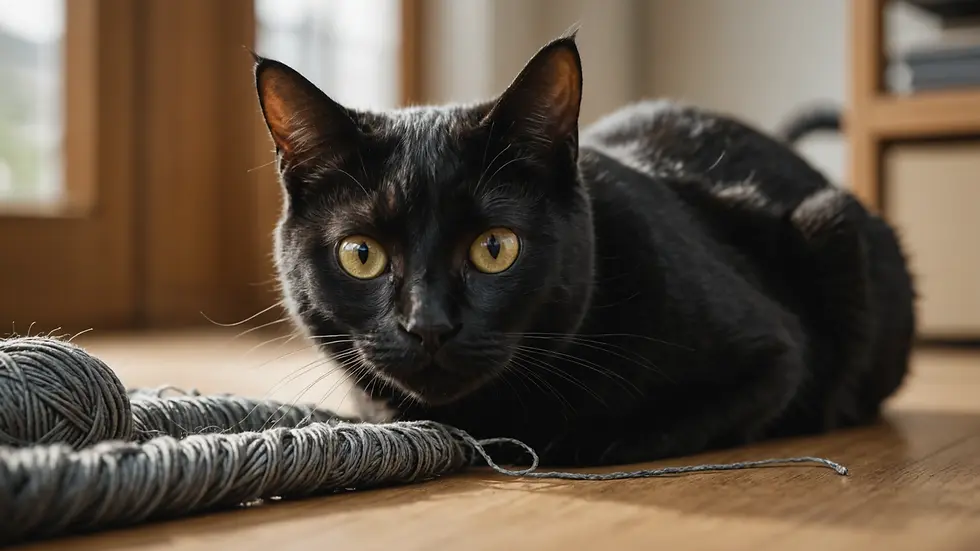Debunking the Mystery: The Truth About Black Cats and Superstitions
- Jyotiraj Borah
- Feb 5
- 5 min read
Unraveling the Myths Surrounding Black Cats
Black cats have long captured our attention, evoking feelings ranging from admiration to fear. While some cultures celebrate them as symbols of good luck, others paint them as bad omens. This post aims to clarify the misconceptions surrounding black cats, diving into their historical significance, cultural beliefs, and the reality behind their unwarranted reputation.
A Brief History of Black Cats in Different Cultures
Cats, especially black ones, have played important roles throughout history. For instance, in ancient Egypt, black cats were not just pets; they were revered and sometimes goddess incarnations. The goddess Bastet was symbolized by a black cat, and owning one was believed to bring prosperity.
Conversely, during the Middle Ages in Europe, black cats faced persecution. The 13th century saw the Catholic Church branding them as associates of witches, often leading to tragic outcomes where many black cats were killed alongside accused witches. In fact, during this time, estimates suggest that around 60,000 suspected witches were executed, with many of them owning black cats.
This shift from reverence to fear highlights how cultural narratives can significantly impact the human-animal relationship.
The Superstitions Surrounding Black Cats
The Roots of the Bad Luck Reputation
The bad luck association with black cats likely originated from folklore. The Catholic Church's 13th-century decree branded them as "servants of the devil," thereby linking their sightings to negative events. This label created a stigma that drastically affected black cats, perpetuating the view of them as bringers of misfortune. Even today, surveys show that around 25% of people still believe they are unlucky.
Cultural Contrasts in Beliefs
However, not all cultures share this negative perception. In Japan, for example, a black cat crossing your path is often viewed as a sign of good luck. Data from surveys show that approximately 20% of Japanese people extend their fondness for black cats, holding them in high esteem. Likewise, in parts of Scotland, if a black cat arrives at your home, it is believed to bring prosperity—an encouraging notion for cat lovers.
These cultural variations reveal that superstitions are not absolute; perceptions about black cats can vary widely depending on one’s background.
The Psychology Behind Superstitions
Understanding the Belief in Superstitions
Superstitions often emerge from a desire to make sense of the unknown. They can serve as coping tools, offering comfort during stressful times. When someone experiences a series of unfortunate events, associating them with black cats allows for a sense of control over those experiences.
Cultural conditioning significantly influences this belief system. Research indicates that around 70% of people hold certain superstitions since childhood based on family traditions and community folklore concerning black cats.
Media Influence and Pop Culture
The portrayal of black cats in literature and film further complicates their image. Films often depict them as ominous figures, reinforced by characters like the witch’s familiar. Such representations solidify negative stereotypes and can lead to ongoing fear and misunderstanding. The rapid spread of these portrayals across social media has only intensified this trend, highlighting the need for awareness and education.
The Benefits of Black Cats
The Joy of Owning a Black Cat
Despite their bad reputation, black cats can make delightful companions. They share the same traits as cats of other colors—affectionate, playful, and often uniquely charming. Studies indicate that black cats spend an average of 25% longer in shelters than their lighter-colored counterparts due to their stigma, resulting in thousands of potentially loving pets remaining homeless.
Health Benefits of Cat Companionship
Moreover, owning a cat, including black cats, can enhance overall well-being. Research shows that pet owners experience reduced stress levels, lower anxiety, and even lower blood pressure—up to 10% decrease in some cases. By embracing black cats and dispelling superstitions, more people can discover the happiness and companionship they can provide.
Personal Stories and Experiences
Heartwarming Adoption Tales
Many loving families have shared their experiences in adopting black cats, often highlighting their affectionate and playful nature. One family adopted a black cat named Luna, aware of the stigma she faced. They reported that Luna quickly became a loving and integral member of their household, proving that black cats can bring joy and laughter.
Organizations Changing Perceptions
Animal organizations are now actively promoting black cat adoption through outreach campaigns. By showcasing their unique personalities, these groups encourage more families to consider the joys of adopting black felines. Research shows that these campaigns can increase black cat adoptions by as much as 30% in some shelters, demonstrating the power of changing narratives.
Iconic Black Cats in Popular Culture
Fictional Black Cats in Literature and Film
Black cats frequently appear in stories, embodying both mystery and charm. Characters like Salem from Sabrina the Teenage Witch and the black cat from Coraline showcase the numerous intriguing qualities of these felines. These portrayals can shift perceptions from fear to fascination, allowing audiences to see black cats differently.
Real-Life Famous Black Cats
Real-life black cats like "Higgins" in New Orleans have captured hearts and imaginations. Higgins became a local icon, often seen in social media posts, adored by those who encountered him. Such stories help reframe the conversation around black cats, shifting from misguided fear to admiration.
The Scientific Perspective on Superstitions
Research in Animal Behavior
Scientific research has shown that there is no basis in fact for associating black cats with bad luck. Animal behavior studies indicate that a cat’s color does not impact how it behaves or interacts with humans. In fact, many veterinarians advocate for adopting black cats, highlighting their loving nature and suitability as family pets.
The Role of Education in Changing Attitudes
Education is essential for dismantling harmful beliefs about black cats. By providing accurate and informative resources, individuals can learn to appreciate these animals for what they are, decreasing the stigma. Schools and community programs that address pet care and myths can foster a more accepting environment for black cats, guiding future generations toward understanding rather than fear.
Embracing Truth Over Superstition
The belief that black cats are unlucky stems from ancient superstitions, cultural narratives, and societal influences. Yet, the truth is far less sinister. Black cats, like all cats, can be loving, joyful companions.
By challenging long-held beliefs and sharing positive stories, we can create a more inclusive attitude toward these remarkable creatures. In a world where they are often misunderstood, let’s celebrate black cats for their true nature—wonderful companions deserving of our love.







Comments